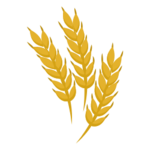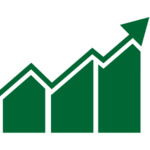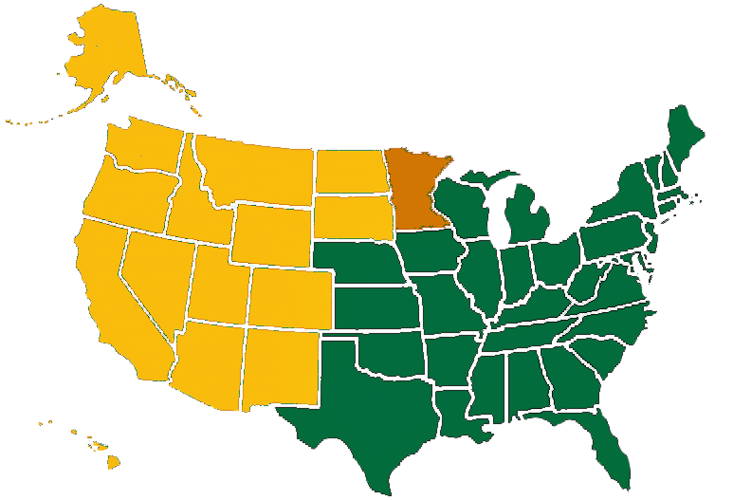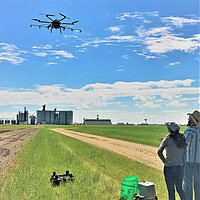MBA in Agribusiness

Accreditation
NDSU's College of Business maintains the highest possible accreditation—a designation reserved for the top 6% of business schools in the world—awarded through the Association to Advance Collegiate Schools of Business (AACSB).
Why an MBA in Agribusiness?

If you see yourself as a future leader in agribusiness, this program is tailor-made for you. Combining the strengths of NDSU's College of Business with the Department of Agribusiness and Applied Economics, it focuses on the intersection of business and agriculture.
Designed for both full- and part-time students, including working professionals, the curriculum totals 30-33 credits. The program is primarily delivered face-to-face in Barry Hall, which houses state-of-the-art infrastructure and technology, including its preeminent Commodity Trading Lab.
Apply Now! |
| Click here to begin |
Contact

Connect with the Graduate Programs Coordinator to start a conversation about your interest in the MBA in Agribusiness program.
Email:
elizabeth.worth@ndsu.edu
Schedule a meeting (in-person or via Zoom):
https://calendly.com/elizabethworth
Career Prospects for Graduates
The MBA in Agribusiness was developed in response to a growing need for managers within the specialized field of agribusiness. Graduates of the program can expect to take new positions or continue employment with agribusiness firms with significant responsibility immediately upon graduation.

The program focuses on providing managers of agribusiness firms a solid background in business, while preparing them to make decisions that consider factors unique to agribusiness, such as:
- production volatility caused by weather, pests, and biology;
- logistics disruptions;
- seasonality in production and consumption;
- long investment and production cycles;
- and linkages with the government, financial institutions, and other organizations.
Commodity Trading Lab
Our state-of-the-art Commodity Trading Lab provides students with real-world learning opportunities in areas such as commodity marketing, logistics, trading, and risk management.
Cost & Funding Opportunities
The College of Business and the Department of Agribusiness and Applied Economics may provide financial assistance through a limited number of graduate assistantships and scholarships. Applicants must be admitted on a conditional or full-standing basis to be considered for either an assistantship or scholarships. Assistantships include a stipend and tuition waiver for NDSU's base graduate tuition in return for work within the college, reducing the tuition cost by about 66%. The tuition waiver is limited to graduate course work. Awards are competitive and administered on a case-by-case basis.
2023-2024 Graduate Tuition & Fee Costs
Tuition Rate | In-State Rate ND Residents |
| Out-of-State Rate All Other U.S. Residents | Non-U.S. Rate International Students |
|---|---|---|---|---|
| Per Credit | $703.44 | $875.95 | $1022.91 | $1182.64 |
| Approximate Program Total (30 credits) | $21,100 | $26,280 | $30,690 | $35,480 |
| Map Key |





Curriculum
The MBA in Agribusiness requires a minimum of 30 credits for degree completion:
12 Core Courses (26 credits)
2 elective courses (4-6 credits)
| Core Courses (26 credits) | ||
|---|---|---|
| AGEC 711 | Applied Risk Analysis I | 3 credits |
| AGEC 744 | Agribusiness I: Agricultural Product Marketing and Agribusiness Strategy | 3 credits |
| AGEC 790 | Agribusiness Seminar | 2 credits |
| AGEC 797S | Comprehensive Project/Agribusiness Strategy (capstone; paper/case) | 2 credits |
| MBA 701 | Strategic Cost Management | 2 credits |
| MBA 702 | Advanced Financial Management | 2 credits |
| MBA 703 | Advanced Organizational Behavior | 2 credits |
| MBA 704 | Supply Chain and Operations Management | 2 credits |
| MBA 705 | Strategic Marketing Management | 2 credits |
| MBA 706 | Information Resources Management | 2 credits |
| MBA 707 | Microeconomics for Managers | 2 credits |
| MBA 708 | Advanced Strategic Management | 2 credits |
Students must take at least two elective courses (4-6 credits). | ||
| FINANCE/RISK | ||
| AGEC 646 | Agribusiness Finance | 3 credits |
| AGEC 712 | Applied Risk Analysis II | 3 credits |
| FIN 640 | International Finance | 3 credits |
| LOGISTICS/SUPPLY CHAIN MANAGEMENT | ||
| MGMT 661 | Supply Chain Management | 3 credits |
| TL 711 | Logistics Systems | 3 credits |
| TL 721 | International Logistics Management | 3 credits |
| TL 723 | Advanced Supply-Chain Planning Across the Enterprise | 3 credits |
| TL 731 | Logistics Decision Analysis | 3 credits |
| TL 829 | Supply Chain Risk Management | 3 credits |
| MARKETING | ||
| AGEC 644 | Commodity Trading | 3 credits |
| MRKT 534 | Sales Management | 3 credits |
| MBA 721 | Creating and Marketing Innovations | 2 credits |
| MBA 722 | Marketing Analytics and Customer Intelligence | 2 credits |
| MBA 723 | Digital Marketing | 2 credits |
| MBA 724 | Integrated Marketing Communications | 2 credits |
| QUANTITATIVE METHODS | ||
| AGEC 739 | Analytical Methods for Applied Economics | 3 credits |
| ECON 610 | Econometrics | 3 credits |
| ECON 710 | Advanced Econometrics | 3 credits |
| MBA 751 | Business Analytics Concepts | 2 credits |
| MBA 752 | Business Analytics Strategy | 2 credits |
| MBA 753 | Business Analytics Methods | 2 credits |
| ADDITIONAL ELECTIVES | ||
| AGEC 652 | Food Laws & Regulation | 3 credits |
| AGEC 674 | Cooperatives | 3 credits |
| AGEC 720 | Food Safety Costs and Benefits Analysis | 3 credits |
| AGEC 725 | Food Policy | 3 credits |
| AGEC 793 | Individual Study | 1-5 credits |
| ECON 640 | Game Theory and Strategy | 3 credits |
| ECON 672 | International Trade | 3 credits |
| MBA 731 | Leading and Managing Teams | 2 credits |
| MBA 732 | Managerial Leadership: Essential Competencies | 2 credits |
| MBA 733 | Managerial Decision Making | 2 credits |
| MBA 734 | Negotiations | 2 credits |
| MBA 736 | Managing Workplace Conflict | 2 credits |
Prerequisite Requirements
Because the MBA degree is structured to serve students from various undergraduate disciplines, a set of foundation course requirements is needed to ensure adequate background preparation. Students should have proficiency in each of the following foundation course areas prior to enrolling in its subsequent MBA core course:
| Proficiency will be determined based upon academic and professional experience, contingent upon review of the applicant's transcript(s) and resume. If it is determined that the applicant is deficient in one or more course areas, they will be given the option to take an approved undergraduate course in that subject (Option 1) or to complete an online, self-paced instructional module (Option 2). Foundation course completion is not required for admission, but rather should occur before the student enrolls in the subsequent MBA course. |
OPTION 1
Most Common for Current Undergraduate Students
| COURSE | NUMBER | SERVES AS A PREREQUISITE FOR: |
|---|---|---|
| ACCT | 200 or 102 | MBA 701 Strategic Cost Management |
| ECON | 105 or 201 + 202 | MBA 707 Microeconomics for Managers |
| FIN | 320 | MBA 702 Advanced Financial Management |
| MGMT | 320 | MBA 703 Advanced Organizational Behavior |
| MRKT | 320 | MBA 705 Strategic Marketing Management |
| STAT | 330 | MBA 704 Supply Chain Management |
OPTION 2
Most Common for Bachelor's Degree Holders/Current Working Professionals
Students wishing to complete an online, self-paced instructional module in order to meet proficiency requirements for one or more of the foundation course areas will be provided with a link to register for the module online. Each module has a fee around $125-150. No course credit is provided for completing these modules.
Contact elizabeth.worth@ndsu.edu for more information.
Admission Requirements
Applications are reviewed on a case-by-case basis using a rolling admission format. The review process is holistic and takes into account all applicable factors, such as past/current CGPA, professional experience, GMAT/GRE score, statement of purpose, letters of recommendation, etc.
An application file must be completed with all required official documents before it can be reviewed for admission. Admission decisions will not be made based upon incomplete application files and/or unofficial documentation.
In order for an application file to be considered complete, the following items must be received by the Graduate School:
- Online Application
- Statement of Purpose + Resume
- Three (3) Letters of Recommendation
- $35 Application Fee
- Official Transcripts (from all institutions previously attended)
- Official GMAT or GRE score*
- Proof of English Proficiency**
Application Instructions
* Official GMAT or GRE Score
Applicants who wish to be considered for a GMAT/GRE exam waiver must make this request with the MBA admission committee.
GMAT/GRE exam waivers are never guaranteed, but rather are considered on a case-by-case basis. Decisions are made at the sole discretion of the MBA admission committee.
Examples of criteria that might qualify an individual for consideration of an exam waiver include the following:
- Applicant has a cumulative post-secondary GPA of 3.5 or higher from accredited or otherwise recognized institutions of higher education
- Applicant has successfully completed two or more post-secondary degrees (bachelor's level or higher)
- Applicant has already earned a terminal degree (e.g. PhD, EdD, MD, JD, PharmD, PsyD, DPT, etc.)
- Applicant has substantial post-baccalaureate professional work experience (typically a minimum of five years) and demonstrated leadership ability
** Proof of English Proficiency
May be met in one or more of three ways:
- Raised in a country in which English is the only official language
- Earned a bachelor's degree or higher from a recognized institution within a country in which English is the only official language; or
- Official English language test score—TOEFL ibt 71 or higher, IELTS academic 6.0 or higher; PTE academic 50 or higher; or Duolingo 100 or higher.


